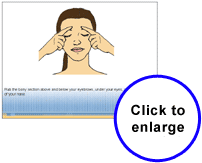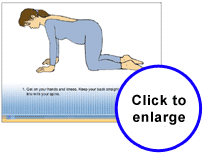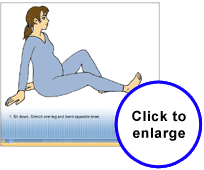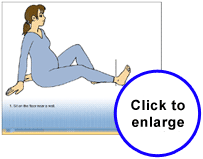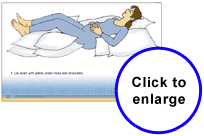MODULE 2
Nine Months of Changes
t. Allergies and Sinus Congestion
Causes
Certain pregnant women notice they are congested or suffer from allergies even though they did not have this condition prior to the pregnancy. It is caused by increased blood flow to the nasal area which causes swelling, dryness, and occasional bleeding.

What can I do?
- Apply petroleum jelly (ex: VaselineTM) to the nasal area to alleviate the dryness and prevent bleeding.
- Place a hot damp towel on your face.
- Breathe the vapours from a vapourizer or from a hot shower.
- Avoid smoke.
- Drink liquids like milk, water, and juice.
- Try saline solution drops in your nose.
- Do not use antihistamines (medication against allergies) without talking to your health care provider.
- Tell your health care provider if your nose bleeds frequently.
- Massage your sinus as follows.
u. Changes in Vision
Causes
The lens of the eye can swell because of the increase in body fluids during pregnancy. This may have a short-term effect on your vision. The cornea on the outside of the eye can also swell causing problems with contact lenses. You do not have to purchase new eyeglasses or contact lenses because this effect usually disappears after delivery.
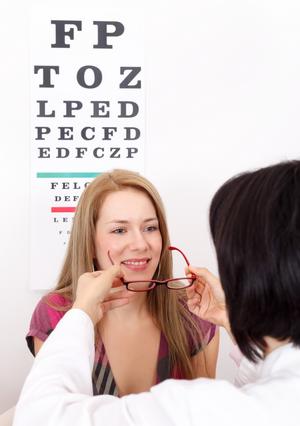
r. Shortness of Breath
Causes
You may feel out of breath during your entire pregnancy. As your uterus gets bigger, it pushes against your ribs, reducing the space in which your lungs can expand. In most cases the shortness of breath disappears when the baby gets bigger and moves down into the pelvis. For most women expecting their first child, this happens about two weeks before the onset of labour.

What can I do?
- There is not much to do to prevent this discomfort. A good posture may help. Having a straight posture will increase the space for your lungs to expand.
- Sleep with several pillows under your head and shoulders.
- Take slow, deep breaths.
- Raise your arms over your head to lift your ribcage.
- Do not get overtired.
- Wear roomy clothes.
If nothing works?
- Talk with your health care provider. Shortness of breath may indicate a lack of iron in your blood.
s. Insomnia
Causes
Certain women have difficulty falling asleep or staying asleep during pregnancy. During the first three months, it is often because the body is adapting to the changes common during pregnancy. Later, during the pregnancy because of the size of your uterus and the baby's movements, you may have difficulty finding a comfortable position to sleep. Insomnia may be more severe for women who experience shortness of breath.

What can I do?
Advice to help you sleep.
If nothing works?
- Do not take any medication to help you sleep before talking with your health care provider.
q. Groin Pain
Causes
Near the end of your pregnancy, you may feel an unpleasant gnawing or stretching sensation in your groin or lower abdomen. This sensation is caused by the weight of the uterus which is stretching the ligaments that hold it in place. You may feel this pain when exercising, coughing or sneezing. It is unpleasant but not serious. Remain active even if you feel this pain.
What can I do?
- Stand straight. A poor posture can cause or aggravate this pain.
- Do not stand for long periods.
- If this pain occurs while exercising try to see what is causing the pain and avoid this movement.
If you have pain in the groin:
- Rub the painful spot lightly using circular motions. Use slight pressure with downward movements.
- To stop a sudden pain, lean against an object for support and use your two hands to raise your belly. This will relieve the pressure. Keep this position until the pain disappears.
- Lie on your painful side and bend your knees towards your belly. This position reduces the pressure on the ligaments and can give quick relief.
- Try the pelvic tilt exercise on your hands and knees.
If nothing works?
- Talk with your health care provider if this situation is painful and occurs frequently.
p. Hemorrhoids
Causes
Hemorrhoids are swollen veins in the rectum. They are caused by the pressure of the baby on the lower part of your belly. They can also be caused by pushing too much when you are having a bowel movement. Hemorrhoids can be painful and annoying and can eventually come out of the rectum. They usually disappear after delivery but in some cases remain for a few more weeks after the birth.
What can I do?
Advice to avoid or alleviate hemorrhoids.
If nothing works?
- Talk with your health care provider.
- Do not use any medication, ointment, or suppository, before talking with your health care provider.
o. Heartburn
Causes
Heartburn occurs when the stomach acids flow back into the lower end of the esophagus (reflux). During pregnancy, there are two causes: hormones relax the muscles of the upper opening of the stomach allowing acids to reflux; and your uterus, which is growing, pushes against the stomach causing acids to flow back into the esophagus.
What can I do?
Advice to avoid heartburn.
If you have heartburn:
- Take small mouthfuls of water or milk.
- Sit or stand straight. The horizontal positions aggravate the condition.
- At night, raise the head of your bed or use additional pillows.
- Try sleeping on your side.
If nothing works?
- Talk with your health care provider or pharmacist before taking any antacids or other type of medication.
m. Stretch Marks
Causes
Reddish or mauvish marks can appear on the breasts, belly, thighs, or buttocks. These marks are caused by the stretching of the elastic skin tissues and by the changes in hormones. These changes may also cause itchiness. With time the red marks will change color and become more silver. Not all women get stretch marks.
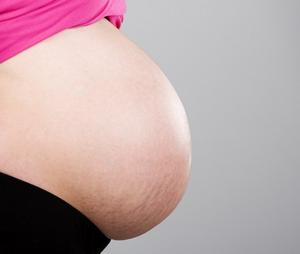
What can I do?
- If you are itchy, rub your skin with an oil or unscented lotion.
- Specialty creams and lotions will not make these marks disappear.
n. Cramps in the Feet and Calves
Causes
Cramps in the feet and calves are more frequent during the last three months of pregnancy. They can be caused by the pressure of the uterus on the blood vessels that descend into the legs. Pointing your toes while stretching can cause cramps.
What can I do?
- Remain active. Exercise stimulates blood circulation in the legs.
- Be careful not to point your toes while stretching especially when you get up in the morning.
- Wear comfortable shoes.
- Avoid standing for long periods.
- Wrap ice in a damp towel and place it on the painful muscles. Leave it for 10 to 12 minutes to relax the muscles.
- If you have a cramp, do not rub or tighten the muscle. The blood vessels are delicate and applying pressure may aggravate the cramp. It is better to stretch gently.
To alleviate cramps in the feet.
To alleviate cramps in the calf
If nothing works?
- Talk with your health care provider if you often have painful cramps.
l. Swelling
Causes
During pregnancy, your body contains more blood and other fluids. This increase is normal but may cause your feet, hands, and face to swell. This occurs generally during the last three months of pregnancy. Approximately eight out of ten women have problems with swelling during pregnancy.
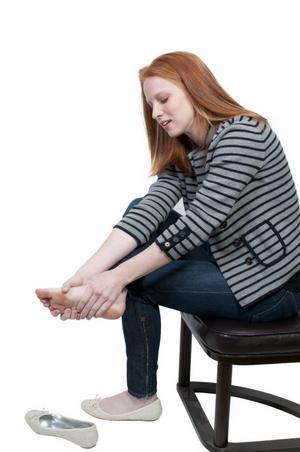
What can I do?
- Avoid tight clothing and accessories such as elastic belts, ankle or knee stockings with wide elastic bands, rings, and watch bracelets that are too tight.
- Try to put on weight gradually.
- Avoid standing for long periods.
- Avoid crossing your legs.
- If your hands are swollen, bend and straighten your fingers and make circles with your hands.
- Rest with your feet elevated as often as possible. Lie down on your left side. This may increase blood circulation and decrease swelling.
- Try to reduce your physical work.
If your ankles and feet are swollen, repeat the following exercise for 10 to 15 minutes twice a day.
If nothing works?
- Consult your health care provider before taking any type of medication.
- If you feel tingling in your hands especially during the night, talk with your health care provider or physiotherapist.
- Consult your health care provider immediately if your hands or face swell suddenly or if they become numb.


